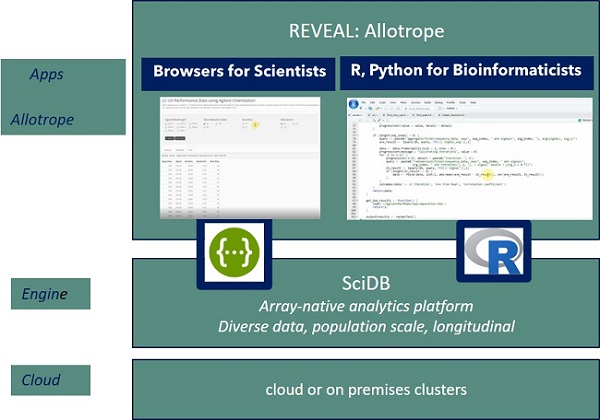Paradigm4 unveiled its scalable solution for efficiently working with the Allotrope Data Format (ADF) at the Allotrope Foundation’s Spring Connect meeting (19-26th April 2021).
Addressing the vital economic challenge of uncovering new critical quality attributes (CQAs), Paradigm4’s REVEALTM Analytical Development app enables data analysts to bring together chemistry, and manufacturing and controls (CMC) data ranging from viscosity and imaging, to particle size, into a platform that can facilitate fast, retrospective analysis and modelling with minimal compute resources. The app is built on top of Paradigm4’s novel computational database engine, SciDBTM, which is purpose-built to handle large-scale heterogeneous scientific data. By allowing computation on data within the database itself, the REVEAL app simplifies compliance.
Paradigm4 presented LC-UV instrument performance data to show how REVEALTM Analytical Development complements the ADF through incorporation of its features into an array-native scientific database management platform, mitigating the challenges posed by in-memory processing of large datasets stored in files. The app also enables data selection and computation from imported ADF files using Python and R APIs.

Zachary Pitluk, Ph.D., VP of Life Sciences and Healthcare at Paradigm4, commented: “The ADF addresses some critical needs in complex data management: uniform storage of diverse types of scientific instrument data and associated metadata, and giving researchers the ability to develop consistent and integrated data processing and analysis pipelines. It is vendor-, platform-, and method-agnostic, and has the capability to store datasets of nearly unlimited size and complexity in a single file, organized as single or multiple n-dimensional arrays. ADF offers a real treasure trove of information, but it can take a large amount of time to extract, transform and load data. Our REVEALTM Analytical Development app natively stores data as multi-dimensional arrays, where each array element can hold an arbitrary number of attributes of any data type. It also supports in-database computation through optimal implementation of algorithms at scale (e.g., regressions, Principle Component Analysis (PCA)), and provides provenance and reproducibility by being an ACID* database system.”
The Allotrope Foundation is an international consortium of pharmaceutical, bio-pharmaceutical and other research-intensive industries that is developing advanced data architecture to transform the acquisition, exchange, and management of laboratory data throughout its complete lifecycle.The Spring Connect meeting brings together all members of the foundation as well as the broader scientific community to discuss ways to standardize data and its interpretation across laboratory and manufacturing operations.
Paradigm4’s REVEAL™ apps are a suite of use case-specific applications that power discovery from population-scale to n-of-1. Other apps developed by Paradigm4 include REVEALTM Single Cell, which enables users to build a multidimensional understanding of disease biology, scale to handle more samples from patients with more cells, and readily assess key biological hypotheses for target evaluation, disease progression, and precision medicine. The REVEALTM Biobank app provides researchers with an easy-to-use way to access their high-resolution, multi-dimensional and multi-attribute data. Users can fluidly combine diverse data sources like genotypic, phenotypic, biomedical imaging, and health records for cross-validation and enrichment. The app is also optimized for scalable advanced analytics and machine learning.
About Paradigm4:
- Based in Waltham MA.
- Multidimensional data solutions serving up science-ready data and enabling scientists to quickly analyse their data.
- Specialists in scientific data management and scalable computation.
- REVEALTM provides end-to-end application-specific solutions transforming hypothesis and evidence generation to advance drug discovery, biomarkers, and precision medicine. Scientists can discover and confirm findings across complex, heterogeneous data from proprietary and public datasets.

















